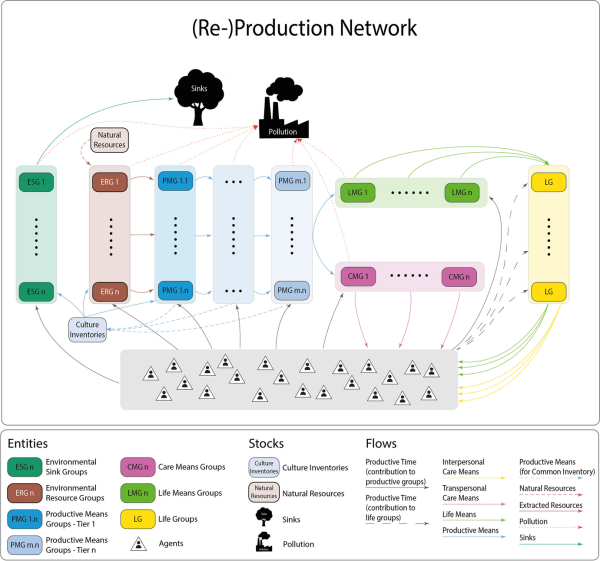An interesting paper about an agent-based model of an economy based on commons. They added quite some complexity including agents with various character traits that form "cultures" and experimented with variations of inclusion, exclusion, and shared inventories.
https://link.springer.com/article/10.1007/s43253-023-00110-0
Similar to my much simpler experiments in https://transform-social.org/en/texts/tools/ inclusion and shared inventories increase the fulfillment of needs. Without shared resources, those agents with more egoist character traits run into economic issues.
Quote from the paper: "Consequently, in the long run, traditionalist’s wellbeing
decreases because their level of cooperation is too low to develop successfully."
#AgentBasedModels #commons #commonism
https://link.springer.com/article/10.1007/s43253-023-00110-0
Similar to my much simpler experiments in https://transform-social.org/en/texts/tools/ inclusion and shared inventories increase the fulfillment of needs. Without shared resources, those agents with more egoist character traits run into economic issues.
Quote from the paper: "Consequently, in the long run, traditionalist’s wellbeing
decreases because their level of cooperation is too low to develop successfully."
#AgentBasedModels #commons #commonism

COMMONSIM: Simulating the utopia of COMMONISM - Review of Evolutionary Political Economy
This research article presents an agent-based simulation hereinafter called COMMONSIM. It builds on COMMONISM, i.e. a large-scale commons-based vision for a utopian society.SpringerLink

Doug Webb •
transform-social •
There is also a German language podcast episode about the paper by @FutureHistories
https://www.futurehistories.today/episoden-blog/s03/e06-stefan-meretz-und-manuel-scholz-waeckerle-zum-simulieren-von-utopien/
#StefanMeretz wrote a German language article "Verteilte commmonistische Planung" in the book "anarchistische gesellschaftsentwürfe" which even mentions the fediverse as a way to explain organization in commonism but I haven't found him or other authors of the paper here yet.
Stefan Meretz und Manuel Scholz-Wäckerle zum Simulieren von Utopien | Future Histories Podcast
Future Histories PodcastDoug Webb •
On the one hand, it's social media and therefore distraction. On the other hand, it's the Real Thing, and it's academically important for theorists to be in it.
@marcusmeindel